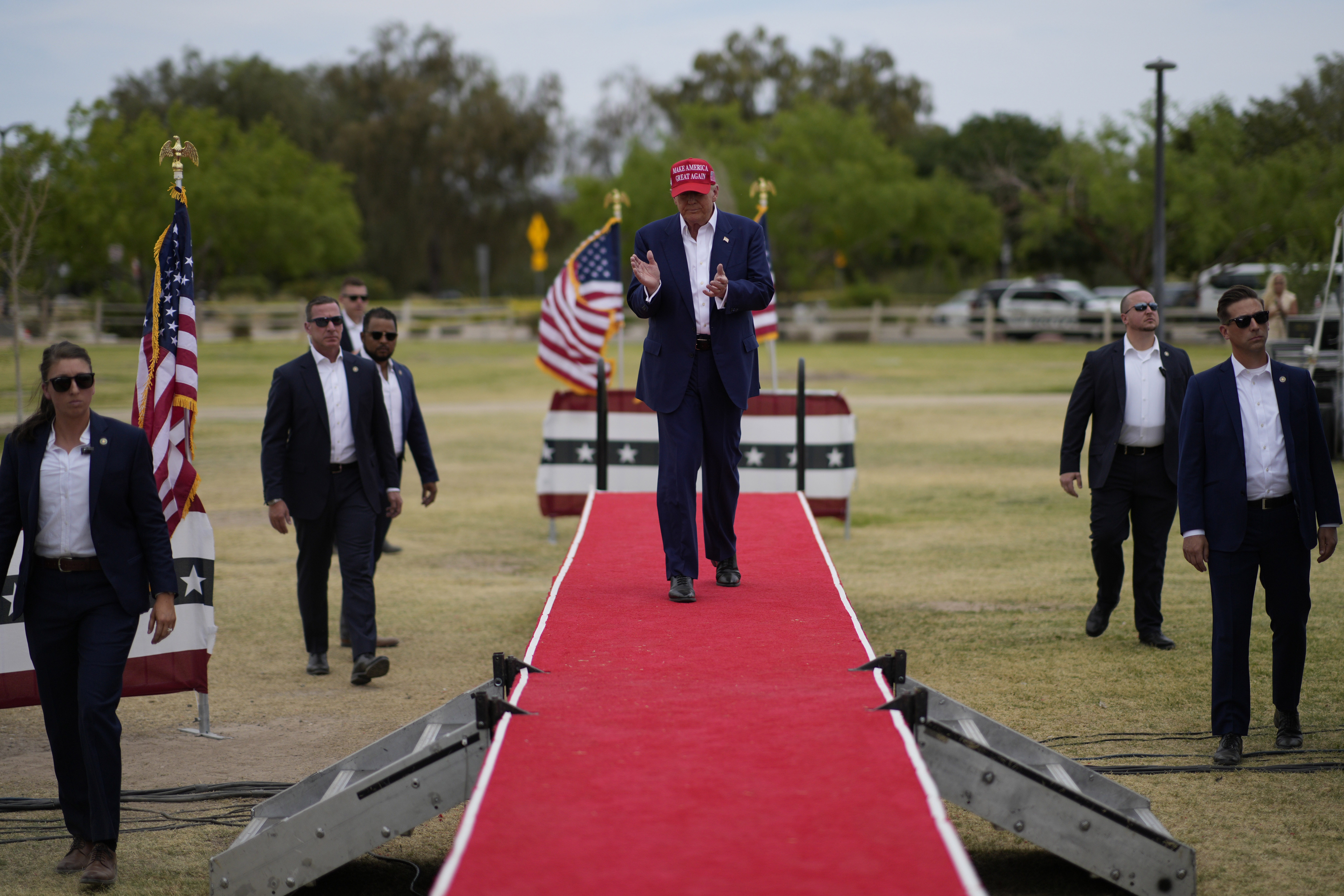'He sounded more like a politician': Trump gets hit by both Dems and his own supporters on abortion
The former president beamed in to talk to Southern Baptists. It backfired.


INDIANAPOLIS — Donald Trump’s problem with abortion politics was never more apparent than it was here Monday, as he delivered brief virtual remarks to a Christian advocacy organization that wants to ban all abortions — and didn't mention the procedure once.
For all his efforts to avoid the issue and “make both sides happy,” as he has long promised, Trump still got hit by both sides — from Democrats for appearing at all, and from some of his own voters in the room for skirting a topic at the top of their agenda.
“He sounded more like a politician who wants to be elected,” said Rick Patrick, the senior pastor of First Baptist Church of Sylacauga, Alabama. “I voted for him and I plan to vote for him again, but he was not like the other speakers who were here talking about religious things.”
In a pre-taped video address just under two minutes long to the Danbury Institute, which calls abortion “child sacrifice,” Trump did not mention the word “abortion” at all, even though the group’s CEO praised Trump in an introduction for addressing, as president, what he called “the most important issue facing our country and the next generation of our children who are being slaughtered in the womb.”
Instead, Trump told the group, “You just can’t vote Democrat. They’re against religion. They’re against your religion in particular.”
The former president’s brief remarks to the Danbury Institute, on the sidelines of the annual meeting of the Southern Baptist Convention, served as the latest example of the tightrope Trump is walking on an issue where polls show he remains vulnerable. Before the address, for which he was billed as a speaker, Trump’s campaign privately cautioned that he would only give a pre-recorded welcome message lasting less than two minutes. His address drew only polite applause and garnered some criticism among anti-abortion Southern Baptist leaders in attendance.
“It’s disappointing because you would hope to have a Republican presidential candidate who speaks strongly that life begins at conception,” said Kevin McClure, an attendee from a Baptist congregation in Louisville who said Florida Gov. Ron DeSantis, whom he backed in the Republican presidential primary, was a better opponent of abortion rights.
Trump’s stated position on abortion — that the issue should be left to the states in the post-Roe era — is in conflict with the hardline position of the Danbury Institute. It is a major liability for him, even though he has taken credit for appointing the Supreme Court justices necessary to overturn Roe.
“The president is not dumb, and he recognizes just how lethal Dobbs was in the midterm elections. From a purely political perspective, I think both the president and even the Republican Party in general realize that where they have been is maybe not where people are, or at least the majority of Americans are,” said Matthew Bartlett, a Republican strategist and former Trump administration appointee.
But Trump also “cannot look like [he is] abandoning the religious right,” Bartlett said. And so he needs to “negotiate with the religious right, show that he understands them.”
Nearly two years out from Dobbs, roughly two-thirds of Americans continue to disapprove of the decision that felled federal abortion protections, according to a mid-April CNN/SSRS poll. And it remains a major issue for suburban women, a key voting bloc Trump has struggled with, according to a spring Wall Street Journal poll of seven swing states.
On the other hand, Trump may have found some middle ground with his stated position view that abortion rights should be left to states. Half of voters in a POLITICO-Morning Consult poll conducted after Trump cemented that stance in early April said they support states making their own laws about abortion access, compared to just 35 percent who do not.
On Monday, Trump’s video remarks came after nearly an hour of discussion earlier in the event about where the anti-abortion movement should be focusing in the post-Roe era — including restricting abortion pills and criminalizing women who receive abortions. Those policy measures would further curtail access to a procedure that is banned in almost all cases in more than a third of the U.S.
A Trump campaign spokesperson previously defended Trump’s appearance at the Danbury Institute, saying he “is committed to addressing groups with diverse opinions on all of the issues.”
But it came at a cost. President Joe Biden's campaign blasted Trump as a politician who “loves campaigning with abortion ban extremists.” And the Indiana Democratic Party joined in Monday morning, accusing Trump of “doing the bidding of the most extreme anti-choice groups in the country.”
Meanwhile, the former president disappointed many anti-abortion advocates still stung by his declining in April to endorse a national limit on abortion, saying that issue should be left up to state lawmakers and voters.
“We want to see abortion gone because it is a human rights issue,” said Tyler Murphy, an associate pastor at Southside Baptist Church in Fulton, Missouri, who supports a national abortion ban. “The federal government needs to protect its people.”
During an abortion-focused panel, Tom Ascol, senior pastor of Grace Baptist Church in Cape Coral, Florida, criticized anti-abortion groups for not taking bold enough positions on abortion since the fall of Roe. He and other speakers lamented the widespread accessibility of abortion pills, which have allowed people who live in states where the procedure is banned to terminate their pregnancies, and said that conservatives need to band together to work toward the complete elimination of abortion.
“Some of the pro-life organizations said, ‘Look, we've abolished abortion in America.’ No, we have not,” Ascol said.
And abortion was not the only issue on the religious leaders’ minds as was evident throughout the convention’s early proceedings. Prominent evangelical leader Al Mohler, president of the Southern Baptist Theological Seminary, said that Christians have before them a “bigger task than ever before” as he touted a resolution that is being put forward at the Southern Baptists’ annual meeting voicing opposition to in vitro fertilization as typically practiced in the U.S.
“We're about to find out how pro-life the pro-life movement is,” Mohler said.











